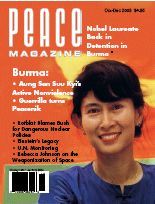
Peace Magazine Oct-Dec 2003, page 4. Some rights reserved.
Search for other articles by PMag staff here
One of the big unresolved challenges of our day concerns our responsibility to the victims of violent oppression in other countries - especially in dictatorships. Most world leaders seems to oppose, for the moment, the recommendations previously discussed in Peace Magazine in the document called "Responsibility to Protect," which suggests that the international community may legitimately take action against a government that harms, rather than protects, its own people. This principle, if accepted as international law, would limit the applicability of the rule of sovereignty which allows dictators to reject civilizing demands from the rest of the world.
At the present, the most egregious case of tyranny is Burma, whose ruling military junta now call the country "Myanmar," contrary to the name still preferred by most Burmese. The dictatorial regime defies all demands for the release of Nobel laureate Daw Aung San Suu Kyi, who has been in detention almost constantly since the dictators crushed a nonviolent popular uprising in 1988. When, for a time, she was released from house arrest, her immense popularity, as leader of the pro-democracy movement, became evident in her travels around the country. Four months ago, her caravan was set upon in the northern part of the country by a gang of thugs obviously acting on government orders. Nearly 100 people died and Mrs. Aung San Suu Kyi was imprisoned, though the ruling generals called her incarceration "protective custody."
In August American diplomats stated that she had begun a hunger strike, but a representative of the International Red Cross later visited her and denied that this was so. In any case, the United States has taken strong measures to pressure the Burmese junta to release her. Congress passed the toughest economic sanctions that it had ever imposed on any country except Cuba. These moves freeze Burma's assets in the United States, deny entry to its officials, and prohibit the import of goods from that country. Other countries should do the sam.
In this issue we present two articles about Burma. Yeshua Moser-Puangsuwon compares the nonviolent approach of Burma's democracy movement to Gandhi's campaign for India's independence from Britain. And Ler Wah Lo Bo describes his astonishing transition from his career as a guerrilla fighting against the Burmese army into a nonviolent activist documenting the location of land mines in the same region. His group had set some of them.

Peace Magazine Oct-Dec 2003, page 4. Some rights reserved.
Search for other articles by PMag staff here